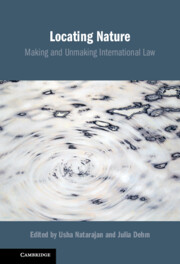Book contents
- Locating Nature
- Locating Nature
- Copyright page
- Contents
- Contributors
- Foreword
- Acknowledgements
- Introduction: Where Is the Environment?
- Part I Locating Nature in International Law
- Part II Unmaking International Law
- Part III Alternatives and Remakings
- 10 Three Enclosures of International Law
- 11 The Mythic Environment
- 12 Law and Politics of the Human/Nature
- 13 Narrating Nature
- 14 Inter-Nation Relationships and the Natural World as Relation
- Conclusion
- Index
11 - The Mythic Environment
Ecocosmology and Narrative Remakings of Environmental Consciousness
from Part III - Alternatives and Remakings
Published online by Cambridge University Press: 22 September 2022
- Locating Nature
- Locating Nature
- Copyright page
- Contents
- Contributors
- Foreword
- Acknowledgements
- Introduction: Where Is the Environment?
- Part I Locating Nature in International Law
- Part II Unmaking International Law
- Part III Alternatives and Remakings
- 10 Three Enclosures of International Law
- 11 The Mythic Environment
- 12 Law and Politics of the Human/Nature
- 13 Narrating Nature
- 14 Inter-Nation Relationships and the Natural World as Relation
- Conclusion
- Index
Summary
This chapter understands international law as more than a technocratic device to engineer changes in human behaviour and the environment. Law is a social and cultural process guided by myth and narrative. This chapter seeks new and better narratives to contest the foundational myths of modernity and development that shape our discipline and world. Rather than crafting new norms from the conventional centres of geopolitical power in the West and universalising them, this chapter calls for pluralised value formation that learns from diverse legal traditions. Such a myth protects the environment through transforming the process of global value formation. The chapter first examines how nature shapes mythology, looking at the role of the cosmic horizon in shaping social norms. It argues that the nexus of cosmos, nature and myth-making is not a phenomenon of ages past but plays a role in contemporary international environmental law. The chapter asks whether the discovery of countless Earth-like planets today could help us reimagine our Earth and global community in a healthier way, and considers the implications of our expanding cosmic horizon for rethinking international law and policy.
Keywords
Information
- Type
- Chapter
- Information
- Locating NatureMaking and Unmaking International Law, pp. 284 - 306Publisher: Cambridge University PressPrint publication year: 2022
Accessibility standard: Unknown
Why this information is here
This section outlines the accessibility features of this content - including support for screen readers, full keyboard navigation and high-contrast display options. This may not be relevant for you.Accessibility Information
- 3
- Cited by
